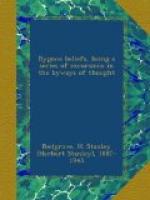The common opinion concerning alchemy is that it was a pseudo-science or pseudo-art flourishing during the Dark Ages, and having for its aim the conversion of common metals into silver and gold by means of a most marvellous and wholly fabulous agent called the Philosopher’s Stone, that its devotees were half knaves, half fools, whose views concerning Nature were entirely erroneous, and whose objects were entirely mercenary. This opinion is not absolutely destitute of truth; as a science alchemy involved many fantastic errors; and in the course of its history it certainly proved attractive to both knaves and fools. But if this opinion involves some element of truth, it involves a far greater proportion of error. Amongst the alchemists are numbered some of the greatest intellects of the Middle Ages—ROGER BACON (c. 1214-1294), for example, who might almost be called the father of experimental science. And whether or not the desire for material wealth was a secondary object, the true aim of the genuine alchemist was a much nobler one than this as one of them exclaims with true scientific fervour: “Would to God . . . all men might become adepts in our Art—for then gold, the great idol of mankind, would lose its value, and we should prize it only for its scientific teaching."[1] Moreover, recent developments in physical and chemical science seem to indicate that the alchemists were not so utterly wrong in their concept of Nature as has formerly been supposed—that, whilst they certainly erred in both their methods and their interpretations of individual phenomena, they did intuitively grasp certain fundamental facts concerning the universe ofthe very greatest importance.
[1] EIRENAEUS PHILALETHES: An Open Entrance to the Closed Palace of the King. (See The Hermetic Museum, Restored and Enlarged, ed. by A. E. WAITE, 1893, vol. ii. p. 178.)
Suppose, however, that the theories of the alchemists are entirely erroneous from beginning to end, and are nowhere relieved by the merest glimmer of truth. Still they were believed to be true, and this belief had an important influence upon human thought. Many men of science have, I am afraid, been too prone to regard the mystical views of the alchemists as unintelligible; but, whatever their theories may be to us, these theories were certainly very real to them: it is preposterous to maintain that the writings of the alchemists are without meaning, even though their views are altogether false. And the more false their views are believed to be, the more necessary does it become to explain why they should have gained such universal credit. Here we have problems into which scientific inquiry is not only legitimate, but, I think, very desirable,—apart altogether from the question of the truth or falsity of alchemy as a science, or its utility as an art. What exactly was the system of beliefs grouped under the term “alchemy,” and what was its aim? Why were the beliefs held? What was their precise influence upon human thought and culture?




